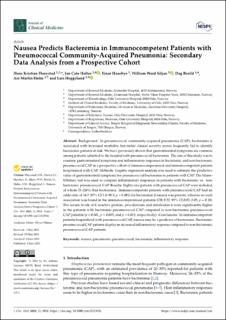| dc.contributor.author | Fløystad, Hans Kristian | |
| dc.contributor.author | Holter, Jan Cato | |
| dc.contributor.author | Husebye, Einar | |
| dc.contributor.author | Siljan, William Ward | |
| dc.contributor.author | Berild, Dag | |
| dc.contributor.author | Holm, Are Martin | |
| dc.contributor.author | Heggelund, Lars | |
| dc.date.accessioned | 2024-01-17T12:48:03Z | |
| dc.date.available | 2024-01-17T12:48:03Z | |
| dc.date.created | 2023-08-30T08:58:51Z | |
| dc.date.issued | 2023 | |
| dc.identifier.issn | 2077-0383 | |
| dc.identifier.uri | https://hdl.handle.net/11250/3112174 | |
| dc.description.abstract | Background: In pneumococcal community-acquired pneumonia (CAP), bacteremia is associated with increased mortality, but initial clinical severity scores frequently fail to identify bacteremic patients at risk. We have previously shown that gastrointestinal symptoms are common among patients admitted to the hospital with pneumococcal bacteremia. The aim of this study was to examine gastrointestinal symptoms and inflammatory responses in bacteremic and non-bacteremic pneumococcal CAP in a prospective cohort of immunocompromised and immunocompetent patients hospitalized with CAP. Methods: Logistic regression analysis was used to estimate the predictive value of gastrointestinal symptoms for pneumococcal bacteremia in patients with CAP. The Mann–Whitney test was used to compare inflammatory responses in patients with bacteremic vs. non-bacteremic pneumococcal CAP. Results: Eighty-one patients with pneumococcal CAP were included, of whom 21 (26%) had bacteremia. Immunocompetent patients with pneumococcal CAP had an odds ratio of 16.5 (95% CI 3.0–90.9, p = 0.001) for bacteremia if nausea was present, whereas no such association was found in the immunocompromised patients (OR 0.22, 95% CI 0.02–2.05, p = 0.18). The serum levels of C-reactive protein, procalcitonin and interleukin 6 were significantly higher in the patients with bacteremic pneumococcal CAP compared to non-bacteremic pneumococcal CAP patients (p < 0.001, p = 0.005, and p = 0.019, respectively). Conclusions: In immunocompetent patients hospitalized with pneumococcal CAP, nausea may be a predictor of bacteremia. Bacteremic pneumococcal CAP patients display an increased inflammatory response compared to non-bacteremic pneumococcal CAP patients. | en_US |
| dc.language.iso | eng | en_US |
| dc.publisher | MDPI | en_US |
| dc.rights | Navngivelse 4.0 Internasjonal | * |
| dc.rights.uri | http://creativecommons.org/licenses/by/4.0/deed.no | * |
| dc.title | Nausea Predicts Bacteremia in Immunocompetent Patients with Pneumococcal Community-Acquired Pneumonia: Secondary Data Analysis from a Prospective Cohort | en_US |
| dc.type | Journal article | en_US |
| dc.type | Peer reviewed | en_US |
| dc.description.version | publishedVersion | en_US |
| dc.rights.holder | Copyright 2023 The Author(s) | en_US |
| dc.source.articlenumber | 3924 | en_US |
| cristin.ispublished | true | |
| cristin.fulltext | original | |
| cristin.qualitycode | 1 | |
| dc.identifier.doi | 10.3390/jcm12123924 | |
| dc.identifier.cristin | 2170713 | |
| dc.source.journal | Journal of Clinical Medicine | en_US |
| dc.identifier.citation | Journal of Clinical Medicine. 2023, 12 (12), 3924. | en_US |
| dc.source.volume | 12 | en_US |
| dc.source.issue | 12 | en_US |

